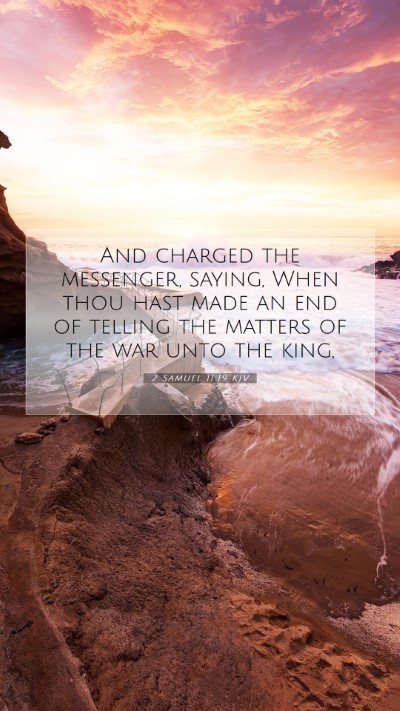Bible Verse Meaning: 2 Samuel 11:19
Verse: 2 Samuel 11:19 states, "And charged the messenger, saying, When thou hast made an end of telling the matters of the war unto the king." This verse takes place in the context of David's military decisions and provides significant insights into the nature of communication and accountability in leadership.
Overview of 2 Samuel 11
This chapter narrates a critical moment in King David's rule which involves his actions regarding Uriah the Hittite and the consequences that follow. The intricacies of the events lead to profound reflections on moral authority and the heaviness of kingly decisions.
Bible Verse Interpretations
- Matthew Henry: Henry emphasizes that this passage reflects the serious nature of duty and charge that David imparts to the messenger. It signifies the importance of delivering messages with accuracy, especially in the context of war.
- Albert Barnes: Barnes notes that the king's command indicates a structured approach to communication in royal matters. It highlights the protocol expected in military communications, reflecting on David's leadership and responsibilities.
- Adam Clarke: Clarke provides insight into the responsibilities placed on the messenger and the expectations of loyalty in conveying critical news, pointing out the implications of such messages and their potential impact on the morale of those involved in conflict.
Understanding the Significance
This verse underscores several key themes that are prevalent throughout the Scriptures:
- Leadership: The responsibilities of leaders in delivering communications and directing their troops.
- Accountability: The necessity for accurate communication and the weight of decisions made based on those communications.
- Moral Implications: The ethical considerations of the commands given, especially in light of David's earlier actions regarding Uriah.
Bible Study Insights
For those involved in Bible study groups or seeking online Bible study resources, this verse can lead to discussions on ethical leadership, the consequences of decisions made by those in authority, and the role of communication in relationships. Engaging with this passage opens avenues for understanding how to interpret Bible verses in the context of modern leadership.
Application of the Verse
Considering the grave implications of David’s commands and their outcomes, there is a valuable lesson on the weight of our words and decisions. How then can we apply this understanding of Scripture in our own lives?
- Reflect on Leadership: Whether at work or in community roles, examine how our communications affect those we lead.
- Accountability in Actions: Consider how decisions, even small ones, can have larger consequences, and seek to communicate effectively and ethically.
- Moral Reflection: Assess the ethical dimensions of our communications and decisions in personal and professional settings.
Cross References
This verse can be cross-referenced with:
- 2 Samuel 11:15 - The earlier command regarding Uriah's placement in battle.
- Proverbs 29:2 - Insights on just leadership and its impact on society.
- 1 Peter 2:13-14 - The Christian perspective on authority and submission.
Conclusion
Understanding 2 Samuel 11:19 involves delving into the layers of leadership, communication, and the moral responsibilities that come with authority. These Bible verse meanings and Bible verse interpretations offer valuable Bible study insights that challenge us to consider the depth of our own words and decisions in light of Scripture.


